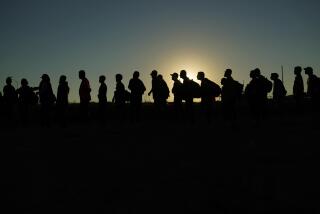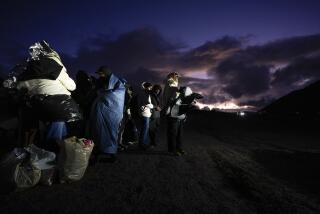Immigrants cautiously await hearing on Obama deportation programs

<p>Texas attorneys discuss suit against Obama’s executive action on immigration outside the U.S. 5th Circuit Court of Appeals in New Orleans.</p>
Construction worker Jimmy Barraza came to New Orleans from Los Angeles after Hurricane Katrina in 2005 to rebuild the city where he eventually married, had two children and made his home.
But earlier that year Barraza, 30, had immigrated from Honduras illegally, and in 2013 he was swept up in a raid at his New Orleans apartment building and detained by U.S. Immigration and Customs Enforcement.
With legal help from a local workers’ group, Barraza was able to stay and get temporary permission to work.
But what he really wants is to apply for a program that would allow him to stay and work for several years. That program, Deferred Action for Parents of Americans and Lawful Permanent Residents, or DAPA, is now tied up in federal court with a hearing here Friday
DAPA would not provide a path to citizenship, but would make some applicants eligible for three-year work permits.
Obama announced the program last fall, along with an extension of Deferred Action for Childhood Arrivals, or DACA, that would end up shielding 5 million people from deportation.
Texas and 25 other states sued to block the programs, arguing Obama overstepped his constitutional authority, and a federal judge in Texas issued an injunction halting the programs while the lawsuit is pending. The government appealed for a stay of the injunction.
Several hundred immigrants, many of them DAPA-eligible parents like Barraza, attended the weekly meeting of a New Orleans workers’ group at a church here Wednesday. At the meeting, Barraza told the Los Angeles Times what the program means to him.
Since he received temporary permission to work, he has been earning from $14 to $16.50 an hour, and has been able to buy health insurance for himself and his family, including his two daughters, ages 4 and 6.
“But I’m still in deportation proceedings,” said Barraza, a fit figure in a camouflage CAT construction cap, jeans and a blue T-shirt advertising the workers group in Spanish.
With DAPA, Barraza said, he and others would be able to negotiate better long-term pay and working conditions.
“When you have a work permit, doors open to you to get jobs,” he said, adding that with DAPA, “we would have much better conditions at work.”
“When I didn’t have papers, I was made to work more than 40 hours a week without [overtime] pay,” he said. “You can’t report any type of abuse, because you’re afraid. You just have to shut up rather than risk being separated from your children. But when you have papers, you can demand your rights.”
Barraza wants Americans to better understand why immigrants enter the country illegally. He says he came in order to help his mother, intending to stay a few years -- long enough to build her a house back in his hometown of Ceiba, which he did.
Now his mother’s kidneys are failing, he says, and the security situation in Honduras has deteriorated. If he returned, he wouldn’t be able to earn enough money to pay for her medical care and send his daughters to school.
Barraza feels betrayed by the leaders of New Orleans, who he said have failed to rally in support of DAPA.
“After Katrina, everyone was welcome to rebuild when it was destroyed,” he said of immigrants. “It’s not fair that they needed us to do the dangerous work; now that it’s 80% rebuilt, we’re not welcome.”
Barraza joined about 200 fellow immigrants and supporters late Thursday for a vigil in Lafayette Square behind the federal courthouse in the central business district. He and others planned to return Friday morning to protest before the hearing. People had traveled from Los Angeles, New York, Houston, Tampa and Washington, D.C., to join them.
As a streetcar packed with tourists passed, the group chanted, “No papers, no fear!” and hoisted signs that said, “Obama: What’s happening with DAPA?” and “Our community risked everything to win DAPA; We will do the same to defend it.”
Leticia Casildo, 35, a housekeeper from Honduras who also moved to the city after Katrina, brought her 7-year-old daughter, Sarah Mendoza, to the vigil, wearing a T-shirt from the workers’ group that said, “We are reconstruction workers.”
Casildo’s shirt said, “Not one more deportation.”
Back in Honduras, she and her husband were police officers. They left because gangs who had infiltrated the police force threatened to kill him, she said.
Sarah is a U.S. citizen, but she has a 15-year-old brother and 13-year-old sister who were born in Honduras and are ineligible for DACA because they came to the U.S. too recently, in 2012.
Casildo worries about them being deported.
“I don’t want my family to be separated,” she said.
Standing nearby was Juan Ramos, 21, who moved to Charlotte, N.C., illegally from El Salvador seven years ago. He was eligible for the DACA extension and had prepared an application so that he could study architecture at the University of Colorado at Boulder.
“We got out hopes up,” he said, “then all this happened, and my dreams went down.”
He called the court battle “just one more obstacle.”
The hearing is expected to last several hours, with a Justice Department lawyer and the Texas solicitor general presenting an hour of oral arguments each before a three-judge panel of the U.S. 5th Circuit Court of Appeals. Both sides are expected to issue statements afterward.
Twitter: @mollyhf
More to Read
Start your day right
Sign up for Essential California for news, features and recommendations from the L.A. Times and beyond in your inbox six days a week.
You may occasionally receive promotional content from the Los Angeles Times.







